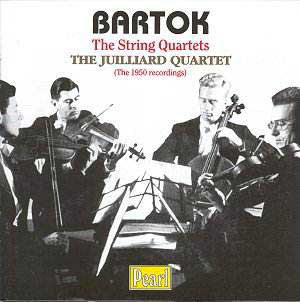There have been three Juilliard cycles of the Bartók
Quartets. The most recent dates from 1981, the most international in its
appeal was from 1963 – by which time only two of the original members
remained - and the first set was recorded in 1950, and now makes a resplendent
reappearance in this Pearl "twofer." In 1950 the Juilliard was
a youthful quartet which had only been formed four years before at the
instigation of William Schuman. Robert Mann and Robert Koff were the violinists,
Raphael Hillyer the violist and Arthur Winograd was the cellist – all
Juilliard faculty members. Robert Matthew-Walker’s sleeve-note is expert
at tracing the recordings’ genesis – made, as his note reminds us, not
on tape but on large acetate discs. The Juilliard had given the first
public American cycle of the quartets in New York during February and
March 1949. Columbia’s chief, Goddard Lieberson, duly signed them up to
make an integral set of the Bartók quartets – adding for good measure
the Schoenberg Quartets amongst a number of prestigious recordings in
the years that followed. The recordings were issued on six 78rpm sets
in 1951 and this Pearl reissue is apparently their first CD incarnation.
They were not by any means the first performances of individual quartets
– No 1 had been recorded by the Pro Arte, No 2 by the Amar-Hindemith and
the Budapest Quartets, No 3 made an early LP appearance courtesy of the
New Music Quartet, the splendid Guilet Quartet essayed No 4 whilst the
Hungarians were back for Nos 5 and 6 – and in the case of the last quartet
the Gertler Quartet set down a recording for Decca and the Erling Bloch
did likewise for HMV.
But this was nevertheless the first complete cycle
and a dramatically auspicious start to the Juilliard’s long career.
All the performances are fully engaged and involved and small technical
or rhythmic incongruities are of very little account in the face of
such committed and often revelatory playing. The earlier incarnation
of the Juilliard lacked the tonal finesse that increased with experience
– and cellist Arthur Winograd was a noticeably less suave performer
than Claus Adam who succeeded him, though that’s not always to Adam’s
advantage in this of all repertoire. The pleasures of the early set
are however legion. Winograd’s ardent expressivity courses through the
first movement of No 1 – not over vibrated and with a rapt intensity.
The Allegretto is illuminated by deliciously swaying rhythmic impetus
and the finale is well controlled, with both violinists varying tonal
production to real musical advantage. In the Second Quartet the Juilliard
manage to integrate the much slower, more ruminative central panel of
the first movement with judicious imagination. In the second movement
there is no etiolation – they mine the mordant, hothouse atmosphere
with impeccable logic and the finale is similarly sensitive. Only some
surface scuffs – from LP transfers? – slightly mar the depth and plangency
of the playing. The Third Quartet of 1927 with its disparities and disjunctions
of tone and dynamics receives an excellent traversal though one perhaps
not optimally adjusted to the vertiginous heights and depths of the
work. Still this is an outstanding performance on its own terms, the
high point of which is the second movement – strongly accented, the
folk inflections integrated, sensible dynamics, resilient and determined
music making, ironclad in rhythm, impressive in stature. The Fourth
Quartet was the one famously criticised by Shostakovich; the Juilliard
meets its exceptional challenges head on. Very occasionally one feels
that the Juilliard hadn’t quite reconciled itself to some of the more
problematic aspects of the writing and were consequently less propulsive
than they might be – but this is a small quibble. They are more than
adequately sensitive in the final movement Non troppo lento.
The Fifth features a most exactingly beautiful slow movement, one to
which the Juilliard brings tremendous reserves of sustaining and luminous
power; the interiority of the movement is delineated with unerring rightness;
listen to the way Hillyer’s viola steals into the texture as one small
but singular example of the finesse and acute ear for balance that all
these performances possess. Equally the fresh air convulsiveness of
the finale is intoxicating – vividly played, humorously inflected, triumphantly
concluded. The Sixth Quartet receives a performance that teems with
passionate declamation. Now driving and intense, now affecting and lyrical,
the Juilliard retain an equipoise and a balance between the polar oppositions
of the work that only strengthens and deepens its profile. This is not
immaculate playing, the tone does roughen and occasionally coarsen but
this is playing that exists through and above such considerations; playing
of immediacy and conviction, of a rare imaginative understanding.
The transfers are, apart from the single instance of
chuffing, excellent and the booklet informative. The performances are,
obviously, outstanding. Whichever cycle you possess, whether by the
Julliard or by other Quartets (the Takacs and Vegh come to mind) this
first cycle will remain of prime importance in the discography of the
Bartók Quartets.
Jonathan Woolf
|


